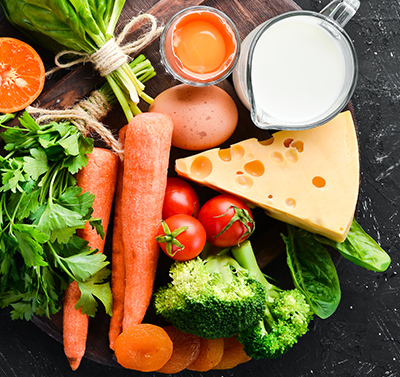Tips for managing problem-prone skin

Our skin is our largest organ ¹. So, it’s not surprising that our skin can cause us stress sometimes. Knowing how to manage problem skin can be tricky, and with all the information online it can be overwhelming and leave you with more questions than answers. Maybe you’ve ended up trying some questionable home remedies that didn’t go too well. After all, they often do more harm than good.
Luckily, you don’t need to tackle problem-prone skin alone. Our researchers have provided six steps for treating problem skin, rooted in scientific research and easy to implement in your day to day routine.
1. Follow a rainbow diet
We’re all told to consume a healthy and balanced diet for our overall wellbeing, but what about our skin? This should be on the top of your list. Research suggests, following a healthy and balanced diet is very closely linked with skin health. In addition, following a low-glycaemic diet may reduce the amount of acne you have ¹. This is a diet that is slowly digested and absorbed causing a smaller rise in blood sugar levels ². Low-glycaemic foods include peas, spinach, kale, blueberries, apples, plums, chickpeas, kidney beans, asparagus, and broccoli. Consuming a variety of fruits and vegetables with different colours, otherwise known as the rainbow diet, is going to feed your skin with the right vitamins and minerals and help them work in synergy together.
2. Consume foods that contain vitamin A
Vitamin A is an essential nutrient that plays a role in cell growth. It also has an array of skin benefits. Evidence suggests that it may help to treat acne.
Studies show there is a strong relationship between a decrease in vitamin A levels and increase in the severity of acne conditions. Patients with severe acne had significantly lower concentrations of vitamins A than those with lower acne grade ³.
Foods that are rich in Vitamin A include ⁴:
- Oily fish such as salmon
- Beef liver
- Sweet potato
- Carrot
- Butternut squash
- Broccoli
- Spinach

3. Professional treatments
After looking at your diet. Visiting a skincare professional for a skin consultation is a good idea. A therapist will assess your skin, ask you questions and recommend the appropriate products for your skin type.
There are treatments available at salons that can help target acne. Our skin researchers recommend peels and light repetitive peeling instead of deep heavy peeling. Alongside professional peels, the LED light therapy treatment is also an excellent add-on for acne.
4. Avoid alcohol
Consuming too much alcohol may worsen your acne. As alcohol can make us dehydrated, it may cause the sebaceous glands in the skin to produce excess oil. Having oily skin may contribute to more breakouts or make current acne worse. If you do find yourself having a drink or two, our skin researchers always recommend having a glass of water in between to keep hydrated ⁵.
5. Remove make up before exercising
Before you participate in any exercise, it’s a good idea to remove any make up you’re wearing. It’s also best to shower immediately after you work out as this may rinse off the bacteria that can cause acne. When washing your face or other areas of the skin that have acne, you should use a cleaner that is oil free, so it won’t clog your pores ⁶.
6. Wash bed sheets frequently
Regularly washing bed linen, pillowcases and towels can help prevent or reduce acne. Especially if you’re prone to back acne. Back acne can occur when the dead skin cells and oil from the sebaceous glands block pores, which may result in inflammation ⁷.
With these recommendations in mind, it’s never too late to manage problem-skin and ensure you’re on the correct path with your nutrition and treatments. Remember, it’s a journey and consistency is key for achieving results.
Sources:
- What are the largest organs in the body? Healthline.
- Can get the right diet get rid of acne. American Academy of Dermatology Association.
- A beginner’s guide to the low glycaemic diet. Health Line
- Does the plasma levels of vitamin A and E affect acne levels. National Library of Medicine. May 2006.
- Vitamin A for acne: Does it work? . Medical News. May 2020.
- Can alcohol cause acne or make it worse? Medial News. June 2020.
- Is your workout causing you acne? American Academy of Dermatology Association.
- How to get rid of acne on the back . Medical News. December 2021.
